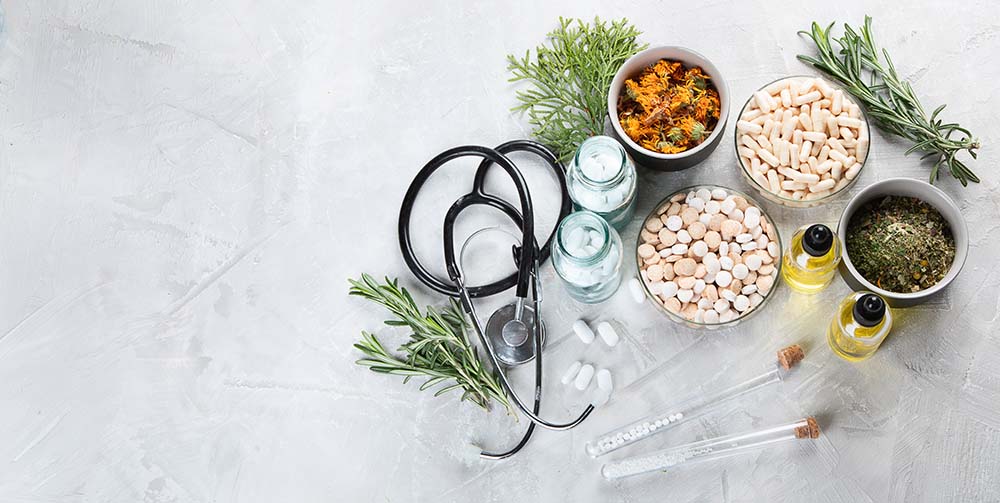Big news! In March 2022, the World Health Organization (WHO) and the Government of India signed an agreement to establish the WHO Centre For Traditional Medicine in Jamnagar, Gujarat. While making the announcement, WHO also published a few interesting statistics. For instance, did you know that around 80 per cent of the world’s population uses traditional medicine? In fact, 170 out WHO’s 194 member states have reported the use of traditional medicine.
In India, there are six formally recognised systems of medicine – Ayurveda, Siddha, Unani & Yoga, Naturopathy, and Homeopathy. Of this, Ayurveda, which literally means ‘science of life’, dates back to 1500 BC, with knowledge that has been preserved and passed since then. But given that modern medicine has made so many strides in recent decades, even performing miracles in certain cases, it’s hard to ignore Allopathy today. What if women could meet their health and wellness goals by combining the two?
“Integrated medicine is a combination of Allopathy and traditional medicine,” says Dr Kalpana Chauhan Raghuvanshi, Lucknow-based Ayurvedic doctor and integrated medicine practitioner. “We usually start treating the patient with Allopathic drugs for quick relief, say for two to five days, and then switch to Ayurveda for long-term benefits and cure. In the second stream, the focus is on lifestyle – sleep, diet, exercise, and stress levels are important factors to consider. Digestive health is a vital element since the premise of Ayurveda is that almost all diseases occur from bad gut health. An understanding of the patient's entire physical and mental health is also required. The three doshas – Vata, Pita, and Kapha -- have to be in proper balance.
“In traditional medicine, the understanding is also that impurities in the blood cause diseases. There is no ‘one size fits all’ treatment in traditional or integrated medicine. If you’re choosing to go with integrated medicine for your health needs, remember that it focusses on the philosophy that prevention is better than cure. Adopting a healthy lifestyle will provide us with a healthier body.”
Gynaecologist, obstetrician, and fertility expert, Dr Priya Selvaraj, says, “We have now started focussing on integrated medicine, with Ayurveda and other holistic wellness streams. I think this is good, provided that both Allopaths and Homeopathic or Ayurvedic practitioners know their limitations and are able to cross-refer with one another. This brings in a healthy unity between specialties and that’s how we should work.”

The exploration of integrated medicine will enable you to look at your body as a whole, rather than just specific illnesses or diseases. It seeks to treat symptoms, but also to understand and treat the cause of those symptoms simultaneously. If you’ve got chronic, long-lasting conditions, such as auto-immune disorders, asthma, arthritis, PCOS, infertility, obesity, and even insomnia, you can greatly benefit from using integrated medicine.
“I was diagnosed with rheumatoid arthritis, which is an inflammation of the joints, a decade ago when I was just 36,” says Joy Reddy, a social entrepreneur. “I was devastated because the disease made every little movement an issue. The things I had taken for granted – writing using a pen, flicking my wrist to play badminton, jogging to catch an early bus – everything was excruciating. Life pretty much came to a standstill. Allopathic drugs helped with recovery in the initial stages. I still take them and will continue to do so. They are life-saving and keep the disease under control, preventing it from worsening. But I hit a plateau at some point and was frustrated.
“So, I started complementing my treatment with traditional medicine – to be specific, Ayurveda. Along with the treatment, the doctor also suggested I change my diet, and that’s what has slowly worked for me. There are lots of anti-inflammatory foods I pack into my diet now, and sugar, excess dairy, alcohol, fried food, and red meat are out of the window. In my case, I feel both streams of medicine have helped me immensely in their own ways, so I would always recommend integrated medicine to women if you find the right doctors.”
Remember though, integrated medicine still needs to be treated seriously – with prescriptions from doctors. Don’t pop those pills indiscriminately or blindly follow recommendations by your yoga coach. You have to visit qualified medical professionals for both traditional and Allopathic medicine streams – there is no substitute for this. It is ideal if you’re able to communicate the recommendations of one practitioner with another.
“For women’s issues, Ayurvedic medicines are extremely helpful. Long-term usage of Allopathic drugs can lead to gut-related problems and other side effects," says Dr Raghuvanshi. "Administering a holistic treatment, wherever required, is helpful, along with adopting the fundamentals of integrated medicine. It is particularly effective in the treatment of fibroids and pregnancy-related issues. These days there are also treatments for fertility. The key negative aspect, of course, is that this is a slow process. In the case of critical ailments, practitioners should use Allopathic drugs. When the patient stabilises, alternate medicine is administered to provide a cure for the disease. It is important to strike a balance between the two streams. Also, certain types of drugs cannot be used in combination, as they lead to side effects, for instance, medicines with metallic content.”
Around the world, and particularly in Asia, traditional medicine continues to play an important role, whether it is the ancient Chinese practice of acupuncture or the Kampo medicine of Japan. When we harness the scientific wisdom of our ancestors and combine it with the marvels of modern medicine, we’ve got a formula that finally works for our bodies, minds, and souls.